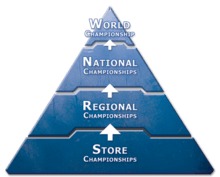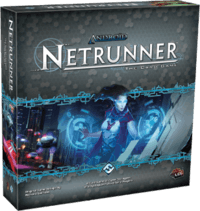Android: Netrunner
|
Android: Netrunner core set box | |
| Designer(s) | Richard Garfield, Lukas Litzsinger, Damon Stone |
|---|---|
| Publisher(s) | Fantasy Flight Games |
| Publication date | 2012 |
| Players | 2 |
| Age range | 14 and up |
| Setup time | < 5 minutes |
| Playing time | 30-60 minutes |
| Random chance | Some |
| Skill(s) required | Card playing, Logic, Bluffing, Strategy |
Android: Netrunner is a Living Card Game (LCG) produced by Fantasy Flight Games. It is a two-player game set in the dystopian future of the Android universe.[1] Each game is played as a battle between a megacorporation and a hacker ("runner") in a duel to take control of data. It is based on Richard Garfield's Netrunner collectible card game, produced by Wizards of the Coast in 1996.[2]
Gameplay
Like the original, the game is asymmetric and involves two players, one playing the Runner, and the other playing a Corporation. The runner wins by hacking into the corporation's computer network and stealing 7 or more points worth of agenda cards. The corporation wins by scoring agenda cards worth a total of 7 or more points. Additionally, the Corporation wins if the Runner is forced to discard more cards than they have in their hand, and the Runner wins if the Corporation can't draw a card when required (due to an empty deck).[3] While the game retains much of the gameplay of the original, there are some key differences.
Differences from the original
- The original Netrunner game was sold in randomized booster packs and semi-random starter decks, similar to Magic: The Gathering and other collectible card games. Fantasy Flight's version has been built like its other Living Card Games. The expansions are sold in fixed, non-random sets, either as monthly packs ("Data Packs"), or, less frequently, deluxe box expansions. While this approach virtually eliminates the secondary card market, card speculation, and draft formats, it also promotes an equal playing field and game play over the value of the cards.
- Fantasy Flight reprinted the original card set and various data packs after they sold out;[4] this is similar to the company's support of its other Living Card Games. Collectible card games (like Magic) do not reprint card sets, preferring to re-build the card base and help support a secondary card market and card pricing speculation.
- The setting for the original game was based on the Cyberpunk 2020 RPG. The game has been moved to Fantasy Flight's Android setting.
- The original game had only two factions: Corp and Runner. The new version splits the two factions into four Corps (Jinteki, NBN, Haas-Bioroid, and the Weyland Consortium) and three Runner types (Anarch, Criminal, and Shaper). Every deck must have an identity card from one of these factions. This card may grant one or more special abilities and sets deck-building constraints.
- A deck cannot have more than three copies of a single card (by name) in it, unless specifically stated on the card (Cards from the Mumbad Cycle). In the original game, no limit was imposed.
- In the original game, the corp had a maximum deck size for specific numbers of agenda points (for example, 18-19 agenda points meant a maximum deck size of 45 cards, 20-21 agenda points meant max 50 cards, and so on). In the new game, the relationship is reversed; a deck size interval is tied to a number of agenda points (for example, a 45-49 card deck must have 20-21 agenda points). This means that the corporation must decide between using the lower number for more consistency, the higher number for lower agenda density, or somewhere in between.
- Some terminology has changed: bits have been replaced with credits, actions replaced by clicks, and data forts replaced by servers. Also, some card types have been renamed (for example, Prep cards are now Events).
- Some mechanics have been simplified or otherwise altered.
- In the original game, the "trace" mechanic was a blind bid, with both players revealing their bids simultaneously. Now traces are done openly, with the Corp bidding first, followed by the Runner.
- In the original game, the Corporation would lose the game if they received 7 Bad Publicity tokens. In Android: Netrunner the Corporation can have any number of Bad Publicity tokens without fear of losing, but each Bad Publicity token gives the Runner a free "temporary use" credit to use during each run.
Due to these changes, cards from the two games are not interchangeable. Richard Garfield has stated that "almost all [changes] are reasonable simplifications or elaborations on the original mechanics", and that he is "confident that care was taken not to change for the sake of change."[5]
Expansions
Cycles
Each Data Pack contains 60 cards and has a complete playset of new cards (typically 3 copies each of 20 cards), and is part of a six-pack "cycle". A new pack is released monthly during the cycle; between cycles the wait is 3 to 4 months.
Genesis
| Expansion Name | Release Date |
|---|---|
| What Lies Ahead | December 2012 |
| Trace Amount | January 2013 |
| Cyber Exodus | February 2013 |
| A Study in Static | March 2013 |
| Humanity's Shadow | May 2013 |
| Future Proof | June 2013 |
Spin
| Expansion Name | Release Date |
|---|---|
| Opening Moves | September 2013 |
| Second Thoughts | November 2013 |
| Mala Tempora | December 2013 |
| True Colors | January 2014 |
| Fear and Loathing | February 2014 |
| Double Time | March 2014 |
Lunar
| Expansion Name | Release Date |
|---|---|
| Upstalk | July 2014 |
| The Spaces Between | August 2014 |
| First Contact | September 2014 |
| Up and Over | October 2014 |
| All That Remains | November 2014 |
| The Source | December 2014 |
SanSan
| Expansion Name | Release Date |
|---|---|
| The Valley | April 2015 |
| Breaker Bay | April 2015 |
| Chrome City | May 2015 |
| The Underway | July 2015 |
| Old Hollywood | August 2015 |
| The Universe of Tomorrow | September 2015 |
Mumbad
| Expansion Name | Release Date |
|---|---|
| Kala Ghoda | January 2016 |
| Business First | March 2016 |
| Democracy and Dogma | March 2016 |
| Salsette Island | April 2016 |
| The Liberated Mind | May 2016 |
| Fear the Masses | June 2016 |
Flashpoint
| Expansion Name | Release Date |
|---|---|
| 23 Seconds | July 2016 |
| Blood Money | August 2016 |
| Escalation | October 2016 |
| Intervention | November 2016 |
| Martial Law | 2016 (unreleased) |
| Quorum | 2016 (unreleased) |
Red Sand
| Expansion Name | Release Date |
|---|---|
| Daedalus Complex | Q1 2017 (unreleased) |
| Station One | Q1 2017 (unreleased) |
| TBA | 2017 (unreleased) |
| TBA | 2017 (unreleased) |
| TBA | 2017 (unreleased) |
| TBA | 2017 (unreleased) |
Deluxe Expansions
Deluxe expansions are released between cycles. Each deluxe expansion focuses on two factions (one Corporation and one Runner) and contains three copies of 55 cards. The fourth deluxe expansion breaks from this pattern by introducing three new Runner "mini-factions" along with its focus on a Corporation.
| Expansion Name | Release Date | Factions | Expansion Icon |
|---|---|---|---|
| Creation and Control | July 2013 | Haas-Bioroid, Shaper | Brain |
| Honor and Profit | May 2014 | Jinteki, Criminal | Helix |
| Order and Chaos | January 28, 2015 | Weyland, Anarch | Eye |
| Data and Destiny | October 28, 2015 | NBN, Runner mini-factions | Trifold |
Narrative Campaign Expansions
Narrative campaign expansions include new player cards (including Runner and Corp identities), PAD sheets to hold stickers that will affect future games played in the same campaign setting, and packs of secret campaign cards and stickers. A Core Set is required to play a narrative campaign expansion.
| Expansion Name | Release Date | Factions | Expansion Icon |
|---|---|---|---|
| Terminal Directive | Q1 2017 (unreleased) | Criminal, Shaper, Haas-Bioroid, Weyland | TBA |
Organized play

Android: Netrunner World Championships occur annually during Fantasy Flight's World Championships. National, regional, and store championships precede this; each event's first-place winner receives a first-round bye in the following level of tournament play.[6] Android: Netrunner tournaments follow a Swiss-system similar to that of Magic: the Gathering, though with a key difference: only two games are played, with each player playing as the Corporation and Runner once. In most tournaments, however, after a certain number of rounds all except the top eight or sixteen players are cut from the tournament. The tournament then shifts to double-elimination bracket, eventually crowning a winner.
Rotation
In November 2014, Fantasy Flight Games announced the concept of rotation, wherein cycles are periodically phased out and considered illegal for tournament play. Under these rules, 5-7 cycles would be legal at any given time, as well as the core set and Deluxe Expansions (which will always remain legal). The first two cycles, Genesis and Spin, will be rotated out in Spring of 2017, at the same time as the eighth cycle is released. Following this, rotation would occur every two cycles, or around every year.[7]
Draft
Draft is an alternate way to play Android: Netrunner, in which players begin the tournament without a deck, rather a randomized, unopened pack of cards. Players have eight packs of ten cards, four each for the Corporation and Runner. Each player begins by looking at their cards in one pack, choosing a card from it, then passing it to another player (either to their left or right, depending on which number pack is being drafted). Each player then selects one of the remaining cards from the pack he or she just received, and passes the remaining cards again. This process continues until no cards are left in the packs. Following this, players repeat the same process with each pack. After this, players are given time to make a Corporation and Runner deck out of the cards drafted, then play a tournament in the same style as standard Android: Netrunner.[8]
A variety of "Draft Packs" are available to draft with. Cards included within the Draft Packs can be either previously released cards or soon to be released. Certain draft cards are unique to draft and illegal in standard tournaments, and are marked as such on the card.
| Draft Pack Name | Release Date |
|---|---|
| Cyber War | February 28, 2014 |
| Overdrive | May 14, 2014 |
| System Crash | November 10, 2014 |
| Hardwired | January 25, 2016 |
Awards
Android: Netrunner has won the 2012 Best Card Game and 2012 Best Two Player Game, at the 2012 BoardGameGeek Golden Geek Awards.[9]
References
- ↑ "Announcing Android: Netrunner". Retrieved 12 February 2013.
- ↑ "Critical Review - Android: Netrunner". Critical Review. Retrieved 28 January 2013.
- ↑ "Android: Netrunner: The Card Game: Rules of Play" (PDF). Fantasy Flight Games. 2012.
- ↑ "The Android: Netrunner Core Set Will Soon Be Back in Stock!". Fantasy Flight Games. Retrieved 28 January 2013.
- ↑ "Tapping the Source Code". Fantasy Flight Games. Retrieved 2013-01-31.
- ↑ "Android: Netrunner Organized Play & Events". www.fantasyflightgames.com. Retrieved 2016-04-24.
- ↑ "When New Programs Overwrite the Old". www.fantasyflightgames.com. Retrieved 2016-04-25.
- ↑ "Draft Play". www.fantasyflightgames.com. Retrieved 2016-04-25.
- ↑ "Golden Geek Awards 2012 – Best Card Game". BoardGameGeek. Retrieved 27 January 2013.
External links
- Official Website
- Android: Netrunner at BoardGameGeek
- Android: Netrunner Review by BoardGameKing
